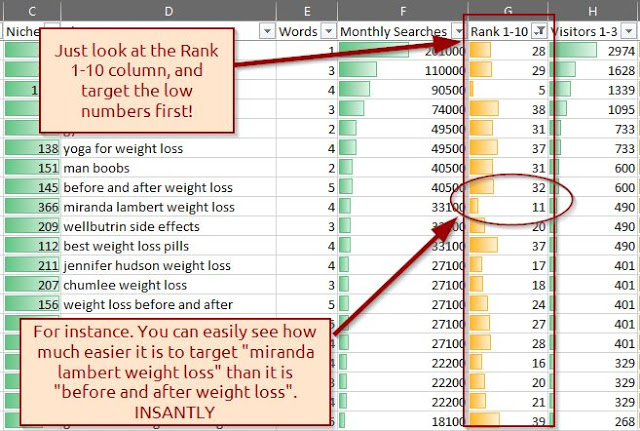Let's quickly clarify what we mean when we use the term Ranking Difficulty in terms of keywords and SEO.
Most of you will likely already be clear on this, but let's make certain!
Ranking Difficulty refers to how much time, effort, and money it will take to be able to rank on Page 1 (Or even position 1) for any given keyword.
There are a number of indicators that can be looked at to try and determine this. It can be done manually, but that takes an in depth understanding of the factors. It also takes a lot of time and effort.
Automated Solutions
Many utilities exist to help with this of course. Such as Market Samurai or Longtail Pro. They are massive time savers for sure! However, they struggle when you want to work in bulk.
Analyzing keywords one at a time, even with these time savers, can still be a massive undertaking.
Using either Market Samurai or Longtail Pro (for example), it would literally take a person weeks to fetch the data.
That's NO B.S.!
Just try loading a list of keywords into either tool, and clicking on them one at a time. Sometimes taking minutes per keyword to analyze. Man.. I don't miss that crap.
The approach I use though uses massive amounts of clustered queries. Tons of proxies, processing tons of keywords at a time!
A Closer Look at the Metrics

In the example above, you can see I have sorted the data by Monthly Searches. Looking for the keywords with the highest traffic. However, what I am really paying attention to here is the "Rank 1-10" column.
Essentially meaning "Ranking Difficulty".
The lower this number, the easier it will typically be to rank for the keyword. The metric is based upon a large number of factors:
Of the Top 10 Results Found for the Keyword:
- What is the average amount of backlinks each page has?
- Are there many pages that have high (or low) Page Authority? (Or DA)
- How many Social Signals does each page have? (Although this data is not included in my spreadsheet, it remains a determining factor behind this metric.)
- How frequently does the exact match keyword occur in the Page Title, URL, or Meta Description?
- What are the MozRankings for the pages found in the Top 10?
- And a number of other less important factors.
So as you can see... This metric is pretty handy!
Instead of getting back 10 keywords from another seller who has simply ran a few random ones through Market Samurai or Longtail Pro, My approach results in MUCH larger sample sets, with even more accurate data.
Word of Warning!! : As always, it is up to you to interpret the data and make decisions upon it! If a keyword seems "Too Good to Be True" it probably is! This can result from a number of things. Moz having incomplete data on a page for instance. Or Google's industry specific ranking systems. Sometimes it will want to rank ECommerce pages for a specific term for instance, and NOT blog articles!
That said, my data is simply the best place to start! There is no better. Trust me, if there was I would be doing that and selling using that approach instead. Keywords are my passion, and this data simply kicks ass. That's all there is to it. ;)
So Which Keywords are Hard, and Which are Easy?
"Well that's all fine and dandy, but I have no experience with these numbers. What should I be looking at in the Rank 1-10 column or know which are easy and which are hard???"Here are the results I've found to be pretty typical myself.
- Rank Values around 10 are typically so easy, you shouldn't even need links to rank Page 1 if you do your On-Site SEO well.
- Rank Values around 20 will also typically rank Page 1 with basic link building without much effort on your part. Although they may take a bit longer to get there.
- Rank Values around 30, yeah you might do well to do some more link building. (Remember to build Internal Links as well!!)
- Rank Values around 40-50 take more effort. You may want some high quality, relevant, external links pointing to pages for those keywords.
- Greater than 50... Those require concerted effort on your part to rank still. Not impossible! Just takes attention to a number of details. You will want good links, social signals, and probably even good Time on Page / Bounce Rate signals before it ranks highly.
- Anything above 80.. I would actually just avoid completely if I were you. Unless you have a really good reason to go after them and have a good budget.
To Simplify Even More:
- Ranking Difficulty is Under 30 - Go for it!
- Ranking Difficulty is Over 30 - Think about it. ;)
First though, we will need a Good Seed Keyword to get started!!